It wasn't an ordinary Thursday. The clouds were clear, the air was fresh and the weather was perfect. As I was arranging the workshop kits inside the beautiful conference room made of bamboo, my attention was caught by indescribable sound of antique brass belts. I was so happy to see participants coming on our traditional wear. The murmuring voices of the participants who weren't on their traditional attire were becoming louder. Most of them blamed their school principals or school heads for not informing them to be in our cultural wear. They began to greet each other on our own language, started to introduce themselves with each other while happily tracing their origins, such a traditional practice. I can really feel the great sense of pride inside the room.
The participants, 75 in total were all indigenous parents belonging to the Blaan and Tagakaolo tribes of Malungon, Sarangani Province. Five mentors who were all indigenous professionals and advocates of cultural development and empowerment joined them too. I saw everyone's excitement in the first 1st Indigenous Parent Leaders Workshop sponsored by Synergeia Foundation and UNICEF. I have been into countless Parent Leaders Workshop in the country but I haven't felt and seen that kind of pride, honor, enthusiasm to share and thirst to be heard. Maybe I strongly felt it because we came from the same cultural roots.
The workshop started with a beautiful prayer from a missionary pastor in a hinterland school. It was followed by my welcome address and statement of purpose. As I thanked everyone for coming, I also made clear that the day was dedicated on the search for "Wanted: Dekalidad na Tribung Ginikanan para sa Dekalibreng Kaanakan (Wanted: Ordinary Indigenous Parents for Extraordinary Children)." I also enjoined everyone to help us rally our mission of educating and empowering the indigenous community while strengthening our cultural identity.
In the Getting to Know section of the workshop, the participants were grouped into four. The first group introduced themselves by stating their name, school and three best attributes as parents while the second group divulged their weaknesses. Everyone was giggling as many of them shared common parental weaknesses. On the other hand, the third group revealed their greatest fears for their schoolchildren while the fourth group cited their biggest dreams.
A situation er about the Indigenous Peoples of Sarangani was presented by Maribeth Farnazo, mentor and Former Program Manager of Sarangani's Indigenous Peoples Development Program. They couldn't stop their heads from nodding and sighing deeply as Beth highlighted the issues we were confronting as an indigenous community.
In a group workshop, parents were grouped according to their tribe and were asked to answer the questions:
a. In our tribe, what cultural values do you want your children to live with and why?
b. Among our cultural practices, what do you think are the ones that they shouldn't continue and why?
All the parents identified, love, high regard and respect to elders, sanctity of marriage, hospitality, close family ties and strong sense of community as the the values that every member of the indigenous community should live on. On the other hand, there were conflicting ideas about the cultural practices that shouldn't be continued. Among those were dwaya (polygamy), dowry, scalot (drowning hands in a boiling water) as a form of justice system and kasfala (tribal dialogue and negotiation).
The morning was heavily-packed with fruitful discussions and sharing. During lunch time, the participants were entertained with Blaan songs and other cultural music by Fais Band. One thing was conspicuous, we couldn't stop ourselves from stamping our feet and joining the Fais Band while they are playing beautiful music. Though still full almost all of us left our chairs, occupied the dance floor and gladly danced our own traditional dance steps.
After an hour of break and entertainment, we continued the workshop. Five representatives were asked to summarize the result of the workshop traditionally. They were asked to wrap it up in a form of chant. We were having goose bumps as we were listening to their chants. The simple statements became more meaningful and full of wisdom as they were told through chanting. The old wisdom were just incomparable. Now I understand why our forefathers tremendously love it. It was just endlessly beautiful.
In a community building exercise facilitated by Mary Joy Dela Cruz, ALS teacher, the 5 groups were asked to collectively draw a community that highlights the theme, "Wanted: Dekalidad na Tribung Ginikanan para sa Dekalibreng Kaanakan." In their group presentation, they all mentioned the need to preserve and cultivate our ancestral lands. They also overly emphasized that we should learn from the mistakes of our grandparents. According to them, they will not sell their remaining ancestral land no matter what happens. Immediately, their commitment to protect their own portion of ancestral land was tested in a decision making and consensus building exercise.
The scenario: Their family has one hectare of land with corn plantation. Aside from a hectare land, their asset includes a white horse from their grandfather; a kmagi (traditional necklace made of gold) a dowry of their great grandmother; a house and lot where the parents and their 5 children are living. The father works as a laborer in a banana plantation and earns P250/day while the mother is a plain housewife. The eldest son who was 20 years old had made her girlfriend pregnant and the parents demanded an immediate marriage. The second child who was 18 years old was arrested because he stubbed his friend while they were drinking in a karaoke bar. The parents of the victim filed an attempted murder case but since they were also a family friend and member of the tribe, they offered to withdraw the case as long as the parents of the accused will pay all the hospital bills of the victim and give away P50,000 cash. Their 16 year old daughter and the third child just graduated from high school and she highly requested her parents to enroll her in college for she is determined to get a degree. The fourth child is still in high school and the youngest one is still in elementary school. As a parent, how will they solve the problems?
The decision making and consensus building exercise greatly tickled their mind but helped them become more strategic and good decision makers. Their innate skill on kasfala (tribal dialogue and negotiation) was also manifested in this activity. After doing the exercise, a moving forward workshop was facilitated by the mentors. The groups were asked if a. What are the traditional practices that they will cultivate among their children?, and b. What are the 3 action steps that they will do to help advance the Indigenous Peoples Curriculum?
The parents agreed to inculcate the love for language, dresses, customary laws, traditional farming and other cultural practices to strengthen our cultural identity. Accordingly, to help advance the indigenous curriculum, they committed to enforce speaking of mother-tongue inside the home, continue the traditional way of story-telling, and above all, encourage their children to educate and empower themselves while strengthening their cultural identity. I am glad that many parents responded to the call for Wanted: Dekalidad na Tribung Ginikanan para sa Dekalibreng Kaanakan and my thanks to Synergeia Foundation and UNICEF for making this activity possible.
The participants, 75 in total were all indigenous parents belonging to the Blaan and Tagakaolo tribes of Malungon, Sarangani Province. Five mentors who were all indigenous professionals and advocates of cultural development and empowerment joined them too. I saw everyone's excitement in the first 1st Indigenous Parent Leaders Workshop sponsored by Synergeia Foundation and UNICEF. I have been into countless Parent Leaders Workshop in the country but I haven't felt and seen that kind of pride, honor, enthusiasm to share and thirst to be heard. Maybe I strongly felt it because we came from the same cultural roots.
The workshop started with a beautiful prayer from a missionary pastor in a hinterland school. It was followed by my welcome address and statement of purpose. As I thanked everyone for coming, I also made clear that the day was dedicated on the search for "Wanted: Dekalidad na Tribung Ginikanan para sa Dekalibreng Kaanakan (Wanted: Ordinary Indigenous Parents for Extraordinary Children)." I also enjoined everyone to help us rally our mission of educating and empowering the indigenous community while strengthening our cultural identity.
In the Getting to Know section of the workshop, the participants were grouped into four. The first group introduced themselves by stating their name, school and three best attributes as parents while the second group divulged their weaknesses. Everyone was giggling as many of them shared common parental weaknesses. On the other hand, the third group revealed their greatest fears for their schoolchildren while the fourth group cited their biggest dreams.
A situation er about the Indigenous Peoples of Sarangani was presented by Maribeth Farnazo, mentor and Former Program Manager of Sarangani's Indigenous Peoples Development Program. They couldn't stop their heads from nodding and sighing deeply as Beth highlighted the issues we were confronting as an indigenous community.
In a group workshop, parents were grouped according to their tribe and were asked to answer the questions:
a. In our tribe, what cultural values do you want your children to live with and why?
b. Among our cultural practices, what do you think are the ones that they shouldn't continue and why?
All the parents identified, love, high regard and respect to elders, sanctity of marriage, hospitality, close family ties and strong sense of community as the the values that every member of the indigenous community should live on. On the other hand, there were conflicting ideas about the cultural practices that shouldn't be continued. Among those were dwaya (polygamy), dowry, scalot (drowning hands in a boiling water) as a form of justice system and kasfala (tribal dialogue and negotiation).
The morning was heavily-packed with fruitful discussions and sharing. During lunch time, the participants were entertained with Blaan songs and other cultural music by Fais Band. One thing was conspicuous, we couldn't stop ourselves from stamping our feet and joining the Fais Band while they are playing beautiful music. Though still full almost all of us left our chairs, occupied the dance floor and gladly danced our own traditional dance steps.
After an hour of break and entertainment, we continued the workshop. Five representatives were asked to summarize the result of the workshop traditionally. They were asked to wrap it up in a form of chant. We were having goose bumps as we were listening to their chants. The simple statements became more meaningful and full of wisdom as they were told through chanting. The old wisdom were just incomparable. Now I understand why our forefathers tremendously love it. It was just endlessly beautiful.
In a community building exercise facilitated by Mary Joy Dela Cruz, ALS teacher, the 5 groups were asked to collectively draw a community that highlights the theme, "Wanted: Dekalidad na Tribung Ginikanan para sa Dekalibreng Kaanakan." In their group presentation, they all mentioned the need to preserve and cultivate our ancestral lands. They also overly emphasized that we should learn from the mistakes of our grandparents. According to them, they will not sell their remaining ancestral land no matter what happens. Immediately, their commitment to protect their own portion of ancestral land was tested in a decision making and consensus building exercise.
The scenario: Their family has one hectare of land with corn plantation. Aside from a hectare land, their asset includes a white horse from their grandfather; a kmagi (traditional necklace made of gold) a dowry of their great grandmother; a house and lot where the parents and their 5 children are living. The father works as a laborer in a banana plantation and earns P250/day while the mother is a plain housewife. The eldest son who was 20 years old had made her girlfriend pregnant and the parents demanded an immediate marriage. The second child who was 18 years old was arrested because he stubbed his friend while they were drinking in a karaoke bar. The parents of the victim filed an attempted murder case but since they were also a family friend and member of the tribe, they offered to withdraw the case as long as the parents of the accused will pay all the hospital bills of the victim and give away P50,000 cash. Their 16 year old daughter and the third child just graduated from high school and she highly requested her parents to enroll her in college for she is determined to get a degree. The fourth child is still in high school and the youngest one is still in elementary school. As a parent, how will they solve the problems?
The decision making and consensus building exercise greatly tickled their mind but helped them become more strategic and good decision makers. Their innate skill on kasfala (tribal dialogue and negotiation) was also manifested in this activity. After doing the exercise, a moving forward workshop was facilitated by the mentors. The groups were asked if a. What are the traditional practices that they will cultivate among their children?, and b. What are the 3 action steps that they will do to help advance the Indigenous Peoples Curriculum?
The parents agreed to inculcate the love for language, dresses, customary laws, traditional farming and other cultural practices to strengthen our cultural identity. Accordingly, to help advance the indigenous curriculum, they committed to enforce speaking of mother-tongue inside the home, continue the traditional way of story-telling, and above all, encourage their children to educate and empower themselves while strengthening their cultural identity. I am glad that many parents responded to the call for Wanted: Dekalidad na Tribung Ginikanan para sa Dekalibreng Kaanakan and my thanks to Synergeia Foundation and UNICEF for making this activity possible.
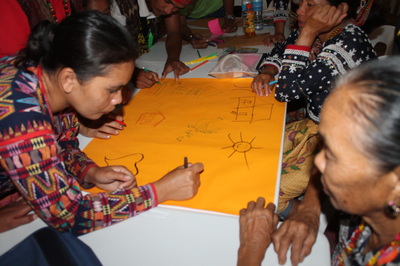
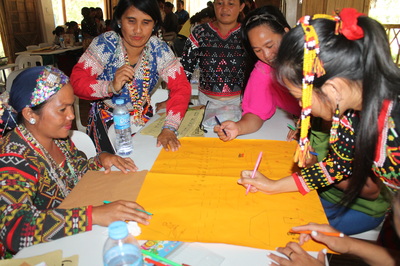
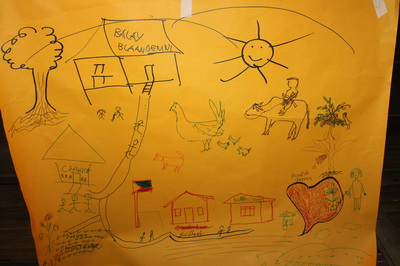
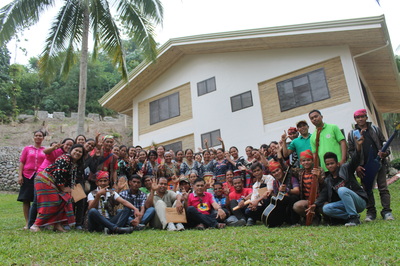
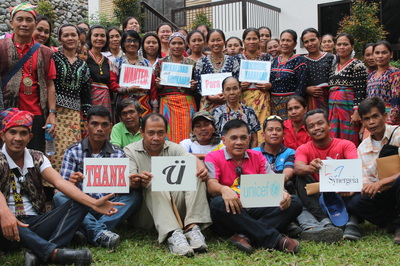
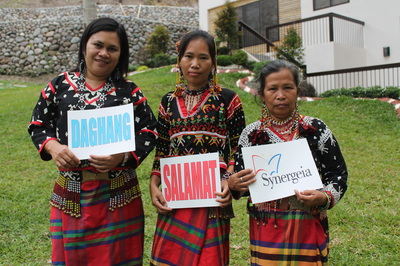
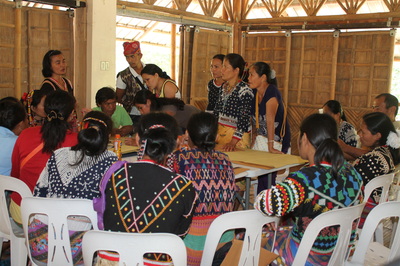
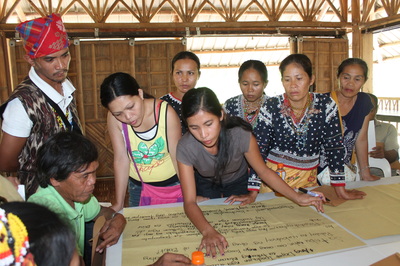
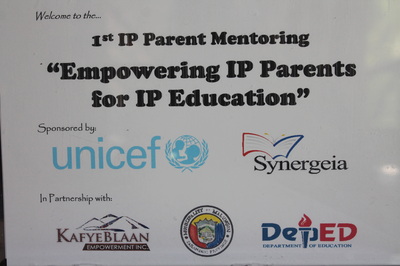
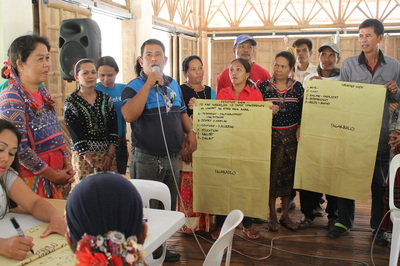
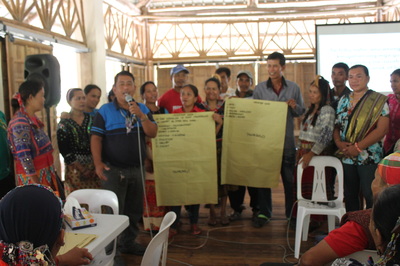
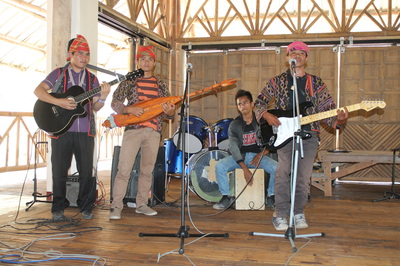
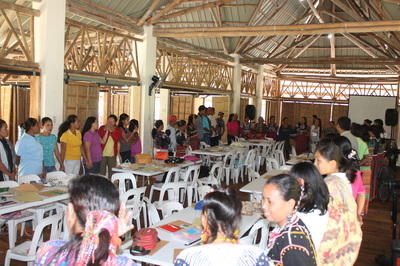
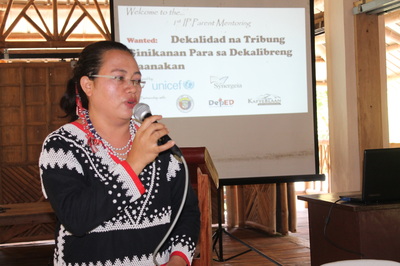
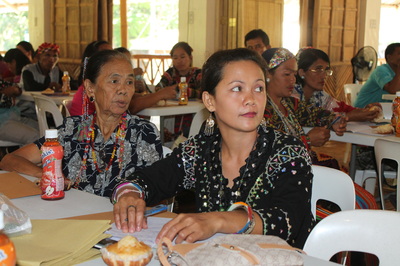
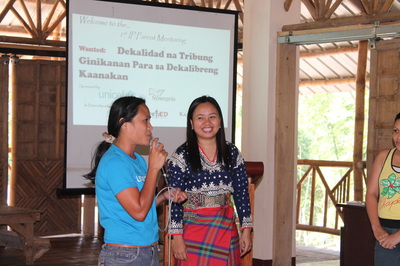
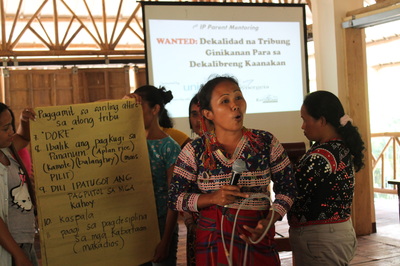
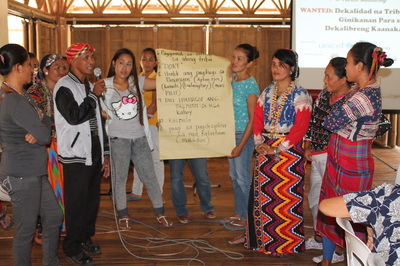
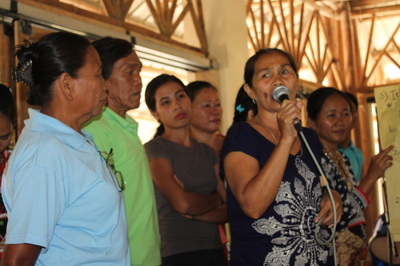
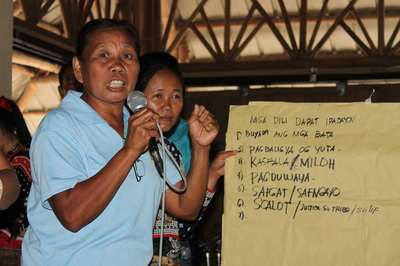
 RSS Feed
RSS Feed
